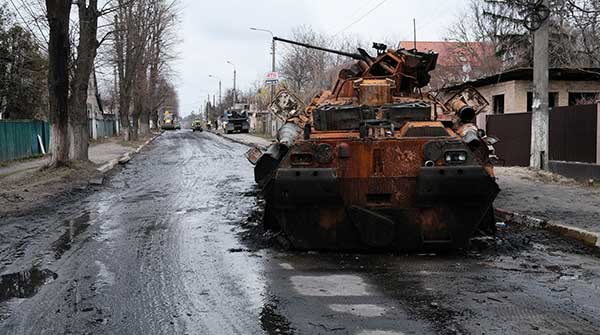If history tells us anything, it is that regional conflicts spread
 Those of us who believe we are in the foothills of a Third World War despair at western leaders’ complacency.
Those of us who believe we are in the foothills of a Third World War despair at western leaders’ complacency.
On 13 Mar. 2023, Britain’s Foreign Secretary announced a derisory £5 billion increase to the UK’s defence budget, apparently ignorant of the fact that the British Army is the smallest it has been since before the Napoleonic Wars. The wasting of the British Army, due, in part, to the Conservative government’s misplaced assumption that cyber and hybrid warfare pose the most serious threats, leaves Britain ill-defended at a time when the war in Ukraine could easily spill over into neighbouring countries.
If history tells us anything, it is that regional conflicts spread. Consider how the 1937 Sino-Japanese War fomented the Pacific War. Of course, American isolationism – a cynical euphemism for self-interestedness, indifference and moral bankruptcy – also played a part in fomenting war. Having turned a blind eye to Japanese militarism, America was caught out at Pearl Harbour. The 1930s hold many lessons, including that:
- isolationism is a hostage to fortune
- appeasement doesn’t work
- fascism is a durable and ambitious ideology
- fascists bully and exploit weakness
- war is contagious
- democracy is fragile and difficult – a matter of balancing, through reason and compassion, myriad competing interests in an ocean of unrest
- democracy must be actively defended, if necessary, by force of arms.
As to whether Britain has the capacity to defend its democracy, former head of the British Army General Lord Dannatt’s 2012 warning is prescient: “In making the army 20 percent smaller, the government is carrying risks”. Conservative MP Colonel Bob Stewart remarked: “If you reduce the numbers you are actually putting the nation more at risk.”
Contagion
The Russia-Ukraine War is quietly spilling over into states that neighbour Ukraine. Russian President Vladimir Putin is using hybrid warfare to destabilize states in Russia’s ‘near abroad’ that, in his estimation, threaten Russia. Hybrid warfare involves using soft-power tools to gain traction over the politics and policies of a state, such that its direction of travel complements the protagonist’s social, economic and political interests. Soft-power tools include:
- inserting agents-provocateurs into a problem state
- recruiting agents-provocateurs within a problem state, perhaps by offering financial inducements to civil society actors such as political parties, trade unions and media outlets
- using economic dependencies to leverage policy changes favourable to the protagonist
- using false flags – events staged by the protagonist that paint a ‘problem’ state in an unfavourable light – to isolate, unnerve and destabilize it
- inventing and propagating false narratives about a problem state to cast it in an unfavourable light. Consider, for example, Putin’s unevidenced claims that Ukraine is run by drug-addled neo-Nazis and is developing chemical and biological weapons
- advancing a theory of ethnicity that denies the possibility that a people’s loyalties, aspirations and identities evolve over time. Consider Putin’s belief that all Russian speakers are primarily citizens of Mother Russia – ‘Russky Mir’ – rather than of their home state.
Moldova
Following the collapse of the Soviet Union, and Moldova’s declaration of independence, the country’s Russian speakers, many of whom lived in the east of the country, declared themselves citizens of Transnistria, a new, independent state bordering Ukraine. The Moldovan government’s acquiescence in this coup saw Russia station circa 1,500 troops in the breakaway. The fait-accomplis that is Transnistria offers Russia two opportunities. Either:
- use Transnistria as a springboard for an invasion of Moldova
- use it as a springboard for incursions into Ukraine.
Some have attributed recent street protests in Moldova to Putin’s desire to restore the whole of Moldova to the Russky Mir. Putin, they say, is cultivating a sense of grievance with a view, perhaps, to invading the Euro-Atlanticist country through Transnistria. Given Russia’s losses in Ukraine, however, some doubt whether the Russian army has the capacity to invade a second European state. The Russian army has lost men and equipment on a scale far greater than it lost in Afghanistan – Russia’s Vietnam moment.
Georgia
Since the end of the Cold War, many Georgians have embraced Euro-Atlanticism. Predictably, this has solicited a spiteful reaction from the Kremlin that has seen:
- the 2008 invasion by Russia of two Georgian regions, South Ossetia and Abkhazia
- the recruitment of agents-provocateurs from within Georgia’s Establishment to return the country to Russia’s orbit. Examples include the role played by Georgian billionaire and founder of the ruling Georgian Dream Party, Bidzina Ivanishvili, who, according to Russia-watcher Therese Raphael writing in Bloomberg.com, enjoys “de facto control over key state institutions, the judiciary and security services”
- the government pressured to introduce a law that requires civil society organizations (media outlets, for example) with 20 percent or more foreign funding to register with the state as’ foreign agents’. Russia introduced a similar law in 2012.
While street protests have forced the government to withdraw its foreign agents law, it may be reintroduced at some future date. Russia’s foreign agents law has helped Putin create what can only be described as a totalitarian state.
Foothills
These developments support the hypothesis that we are in the foothills of a Third World War. All is not lost, however. If Western democracies take decisive action, for example, by spending annually a minimum of five percent of GDP on defence, they will be in a position to use both soft and hard power to deter Russia (and China). The international rules-based order may yet be salvaged.
Dr. Simon Bennett directs the Civil Safety and Security Unit at the University of Leicester. He’s interested in the organizational, social, economic and political origins of risk. He has worked with the Royal Air Force and U.K. National Police Air Service on human-factors issues. His latest book, Safety in Aviation and Astronautics: A Socio-technical Approach, was published by Routledge in 2022.
For interview requests, click here.
The opinions expressed by our columnists and contributors are theirs alone and do not inherently or expressly reflect the views of our publication.
© Troy Media
Troy Media is an editorial content provider to media outlets and its own hosted community news outlets across Canada.


